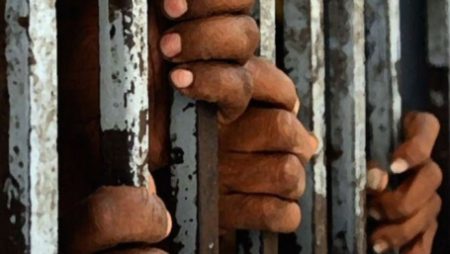The Israeli Supreme Court has added two years to the prison sentence of a Palestinian detained during Israel’s 2014 ground invasion of the Gaza Strip, the Gaza-based al-Mezan Center for Human Rights said in a report issued on Sunday, detailing the prisoner’s torture at the hands of Israeli prison authorities.
Ma’an News Agency reports that, according to al-Mezan, last week, on Feb. 7, the court decided to uphold a request by the Israeli prosecution to increase 28-year-old Jihad Khalid Abu Hadaid’s sentence from six to eight years in Israeli custody.
Abu Hadaid is a client of the al-Mezan center, who stated that the prosecution had filed the extension appeal on Jan. 14, 2016, contesting the court’s initial ruling from November 2015.
The center said it condemns the extension of the prison term, saying that the entire case against him was built on confessions extracted during torture, and, as a result, were inadmissible in court.
Abu Hadaid was detained on July 25, 2014, during an Israeli invasion of the al-Fukhari area of Khan Younis, amid Israel’s devastating 50-offensive on the besieged coastal enclave.
See archive IMEMC video: 09/02/14 Gaza City’s Devastated Al-Shuja’eyya Suburb
At least 250 other Palestinians were captured during the ground invasions, though there have been concerns that Israeli authorities have not been forthcoming about hundreds of Gazan men being secretly held inside Israel. Around 150 were detained on July 24, 2014, alone.
In an affidavit to al-Mezan, Abu Hadaid described the use of torture and other cruel and degrading treatment during his arrest and interrogation by Israeli security forces and authorities.
According to the report, he was beaten, forced to sit in direct sunlight for several hours, and was placed in “stress positions” on a small chair during interrogation while his hands were cuffed behind him.
Abu Hadaid also told al-Mezan he was verbally abused and kept in solitary confinement for several days. During one interrogation session, Abu Hadaid said he was told by Israeli authorities that his house would be attacked, and according to al-Mezan, his home was later hit by an Israeli airstrike.
Abu Hadaid was also prevented from meeting with a lawyer for 21 days after being detained.
“Al-Mezan asserts that the level of coercion used against Abu Hadaid results in a forced confession, which must not be used as evidence in court,” the human rights group’s report read.
“A confession obtained under means of torture, including enhanced interrogation techniques, or other forms of duress is considered a forced confession under international law. The ruling issued by the High Court is dependent on a confession by torture and, as a serious miscarriage of justice, amounts to a serious violation of international law and blatant disregard for justice principles.”
Al-Mezan said they called on the international community to “uphold its moral and legal obligations toward Palestinian prisoners and detainees held by Israel and to exert pressure on Israel to respect international law, in particular the absolute prohibition on torture and ill-treatment and the principles of justice.”
Israel’s mistreatment, abuse, and torture of Palestinian prisoners has been widely documented by rights groups for years, while a recent article by the Israeli newspaper Haaretz confirmed the extent to which Shin Bet interrogators subject their prisoners to torture.
The Public Committee Against Torture in Israel has said that up to 90 percent of Palestinians interrogated by Israel were denied legal access and held incommunicado for at least part of their interrogation, a fact that human rights groups say enables torture.
In Israel’s military court system, which has a 99 percent conviction rate, Palestinians can be held for 60 days without access to a lawyer.
(Photo: Addameer Prisoner Rights Group)
IMEMC Opinion/Analysis — 02/10/17 Torture: As Described by the Interrogators

